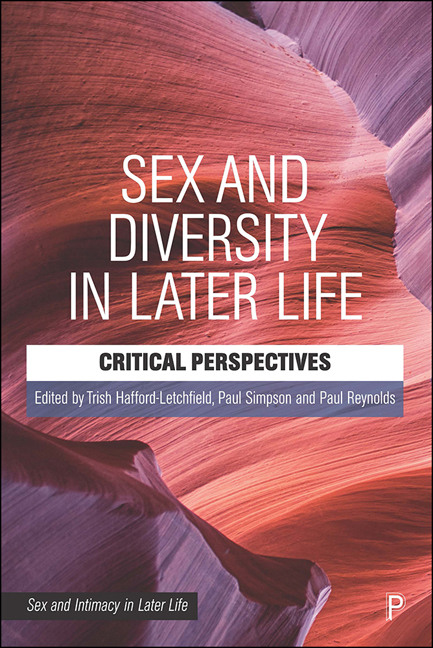Book contents
- Frontmatter
- Dedication
- Contents
- List of figures and tables
- Notes on editors and contributors
- Series editors’ introduction
- Foreword
- 1 Sex and intimacy in later life: a survey of the terrain
- 2 Sexual expression and pleasure among black minority ethnic older women
- 3 Sexual desires and intimacy needs in older persons and towards the end of life
- 4 Heterosexual sex, love and intimacy in later life: what have older women got to say?
- 5 Sex and ageing in older heterosexual men
- 6 Sex and older gay men
- 7 Thinking the unthinkable: older lesbians, sex and violence
- 8 Splitting hairs: Michel Foucault’s ‘heterotopia’ and bisexuality in later life
- 9 The age of rediscovery: what is it like to gender transition when you are 50 plus?
- 10 Ageing asexually: exploring desexualisation and ageing intimacies
- 11 Older people, sex and social class: unusual bedfellows?
- 12 Final reflections: themes on sex and intimacy in later life
- Index
3 - Sexual desires and intimacy needs in older persons and towards the end of life
Published online by Cambridge University Press: 21 December 2021
- Frontmatter
- Dedication
- Contents
- List of figures and tables
- Notes on editors and contributors
- Series editors’ introduction
- Foreword
- 1 Sex and intimacy in later life: a survey of the terrain
- 2 Sexual expression and pleasure among black minority ethnic older women
- 3 Sexual desires and intimacy needs in older persons and towards the end of life
- 4 Heterosexual sex, love and intimacy in later life: what have older women got to say?
- 5 Sex and ageing in older heterosexual men
- 6 Sex and older gay men
- 7 Thinking the unthinkable: older lesbians, sex and violence
- 8 Splitting hairs: Michel Foucault’s ‘heterotopia’ and bisexuality in later life
- 9 The age of rediscovery: what is it like to gender transition when you are 50 plus?
- 10 Ageing asexually: exploring desexualisation and ageing intimacies
- 11 Older people, sex and social class: unusual bedfellows?
- 12 Final reflections: themes on sex and intimacy in later life
- Index
Summary
Introduction
The need for touch, intimacy and sexual pleasure does not diminish with age, nor should it be dependent on how long we have left to live. For too long, the sexual desires and intimate connections of older persons have been, like some embarrassment, swept under the carpet or have been subject to misunderstanding (Zordan, 2009), based on myths concerning a natural or inevitable non-sexual status. Such stereotypical thinking seems deeply ingrained and affects how we perceive older persons in general (Zordan, 2009). In this chapter, I aim to challenge such stereotypes about older people and sexuality, especially focusing on the ‘oldest old’ and older persons experiencing their end of life. I start the main section of this chapter by focusing on the significance of sex and intimacy for older persons. I will address how older persons view sex and intimacy and will draw upon the literature regarding sexual satisfaction and older people. This section will also address the sexual needs and desires of older persons who are living with dementia and those who are living in care homes. I will then develop this chapter further by moving onto sexual and intimate connections for persons who are at the end of life. I begin this chapter by looking at the specialness of sex in terms of its significance for older persons in order to provide a context for discussion of the sensitive subjects of sex and intimacy and persons living with dementia and older persons who are at the end of life.
For the purposes of this chapter, when using the term ‘older persons’ or ‘older people’, I am specifically referring to those aged 75+, which is regarded by the World Health Organization (WHO, 2018) as ‘older old’ or distastefully as ‘late elderly’. Additionally, I aim to demonstrate that older persons can, and do, enjoy a satisfying sex life and their need for intimacy and closeness often persists. I will explore the neglected, sensitive, counter-intuitive if not still taboo subject of sex towards the end of life and in relation older people. This chapter is predicated on the notion that sex is not just about the physical acts of sex, or whom we have or might want to have sex with, although it undoubtedly does encompass that. Sex and intimacy comprise emotions, feelings and desires about how we perceive and experience love, intimacy, touch, pleasure and passion.
- Type
- Chapter
- Information
- Sex and Diversity in Later LifeCritical Perspectives, pp. 39 - 56Publisher: Bristol University PressPrint publication year: 2021



